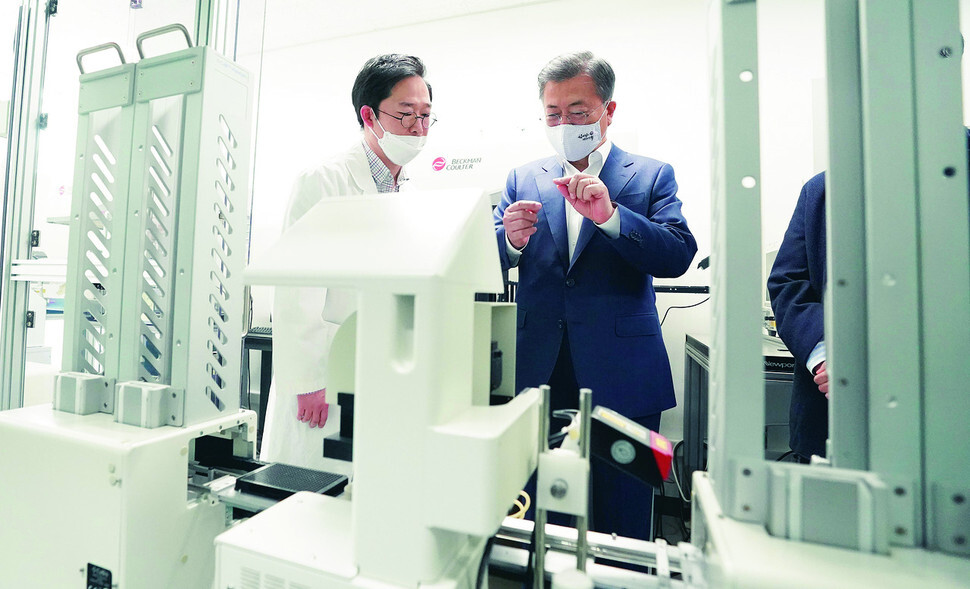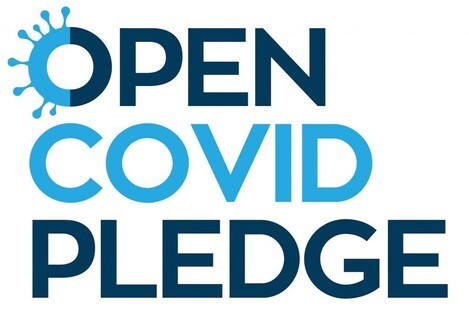hankyoreh
Links to other country sites 다른 나라 사이트 링크
[News analysis] Will sharing intellectual property boost or hinder development of COVID-19 treatments?

Will openness with intellectual property rights be a boon or a hindrance to the development of coronavirus treatments?
Around the world, governments and global pharmaceutical companies are in a race to develop treatments and vaccines for the novel coronavirus. Requests for the diagnostic kits developed by South Korean companies to enable the early response to the virus have been coming in from countries everywhere -- but when it comes to developing treatments and vaccines, there is no comparison. Astronomical sums await treatments for infectious diseases that are currently threatening lives all over the world. The small-scale pharmaceutical company Gilead transformed into a global giant overnight with its development of the novel influenza treatment Tamiflu. Since paying a hefty sum to acquire Tamiflu sales rights, the Swiss pharmaceutical company Roche has been making a mint. Gilead began pulling in the equivalent of 1 trillion won (US$815.12 billion) a year in royalties alone after a novel influenza outbreak in 2009. The South Korean government launched its own "COVID-19 treatment and vaccine development pan-governmental support team” on Apr. 24 and began providing active support by reducing the necessary review procedures and loosening regulations for development.
Some activities have also surfaced that stand in contrast with profit-oriented research and development -- calls for humanitarian solidarity in responding jointly with information sharing and cooperation to a disease that threatens humanity in general.
On Apr. 6, the director-general of the World Health Organization (WHO) announced the acceptance of a proposal by the Costa Rican government to assemble and share all knowledge and technology related to coronavirus eradication into a "pool” to be managed globally. This would include patents potentially applicable to virus diagnosis, prevention, control, and treatment, along with clinical testing data, intellectual property rights, diagnostic devices and equipment, and even the diagrams used for vaccine production. The proposal is that any medications that are found to be effective in treating the virus should be available for anyone to use freely and equally without concerns about patents or a monopoly on information. It's based on the idea that a "public goods” approach of jointly managing information and technology and making it available for free and equal use is more efficient than one that involves protecting rights through patents and monopolies. The European Union and Dutch government have also indicated their support for the idea.

Members of the knowledge sharing movement in South Korea are preparing to send an open letter to President Moon Jae-in calling on him to voice his support for the coronavirus information and technology pooling proposal in his speech at next month's WHO assembly, where he has been invited to attend as a keynote speaker.
"The current R&D and intellectual property right framework, which has focused on the acquisition of monopoly rights, is inefficient when it comes to responding to a crisis situation,” said Nam Hee-sob, a patent attorney who serves as director of the institute Knowledge Commune.
"Since sharing of development content and cooperation among pharmaceutical companies is an efficient approach to overcoming a crisis, we need to transition to an approach based on collaboration and sharing,” he said by way of explaining the background of the campaign.
An active campaign for a new form of "openness” with copyrights has also been spearheaded by knowledge sharing organizations such as Creative Commons. The aim is to encourage intellectual property rights holders who possess information and technology that could help in coronavirus treatment and vaccine development to sign pledges to temporarily refrain from exercising their rights so that they can be shared. Referred to as the "Open COVID License – Patent” approach, it is distinct from past forms of intellectual property rights sharing in its use of a temporary moratorium.
The idea of "Open COVID License – Patent” is that those who own intellectual property rights related to the virus should make the related information and technology available to support treatment and vaccine development and then re-establish their rights once the crisis has ended. The patent availability period would extend from Dec. 1, 2019, until one year after the WHO declares an end to the coronavirus pandemic. The latest period of availability would be through Dec. 31, 2022. This has been developing into a sharing campaign based on voluntary pledges by those holding rights. Major IT companies such as Microsoft, Intel, IBM, Amazon, Facebook, Hewlett Packard, and United Patent have been taking part in the pledges.
"There are limits to this approach in terms of being restricted to a specific scope and period rather than representing a fundamental reform of the patent system,” said C.O.D.E.(Commons, Openness, Diversity, Engagement) Director Yoon Jong-su, whose organization is currently campaigning for copyright sharing, CCL (Creative Commons License).
"But it's significant in spreading the message that the current intellectual property right and patent system is not efficient for resolving an urgent human issue and alerting people to the need for a global response,” he added.
By Koo Bon-kwon, senior staff writer
Please direct comments or questions to [english@hani.co.kr]

Editorial・opinion
![[Column] Life on our Trisolaris [Column] Life on our Trisolaris](https://flexible.img.hani.co.kr/flexible/normal/500/300/imgdb/original/2024/0505/4817148682278544.jpg) [Column] Life on our Trisolaris
[Column] Life on our Trisolaris![[Editorial] Penalties for airing allegations against Korea’s first lady endanger free press [Editorial] Penalties for airing allegations against Korea’s first lady endanger free press](https://flexible.img.hani.co.kr/flexible/normal/500/300/imgdb/original/2024/0502/1817146398095106.jpg) [Editorial] Penalties for airing allegations against Korea’s first lady endanger free press
[Editorial] Penalties for airing allegations against Korea’s first lady endanger free press- [Editorial] Yoon must halt procurement of SM-3 interceptor missiles
- [Guest essay] Maybe Korea’s rapid population decline is an opportunity, not a crisis
- [Column] Can Yoon steer diplomacy with Russia, China back on track?
- [Column] Season 2 of special prosecutor probe may be coming to Korea soon
- [Column] Park Geun-hye déjà vu in Yoon Suk-yeol
- [Editorial] New weight of N. Korea’s nuclear threats makes dialogue all the more urgent
- [Guest essay] The real reason Korea’s new right wants to dub Rhee a founding father
- [Column] ‘Choson’: Is it time we start referring to N. Korea in its own terms?
Most viewed articles
- 1New sex-ed guidelines forbid teaching about homosexuality
- 260% of young Koreans see no need to have kids after marriage
- 3[Column] Life on our Trisolaris
- 4OECD upgrades Korea’s growth forecast from 2.2% to 2.6%
- 5Presidential office warns of veto in response to opposition passing special counsel probe act
- 6Months and months of overdue wages are pushing migrant workers in Korea into debt
- 7[Guest essay] Maybe Korea’s rapid population decline is an opportunity, not a crisis
- 8Trump asks why US would defend Korea, hints at hiking Seoul’s defense cost burden
- 9[Editorial] Penalties for airing allegations against Korea’s first lady endanger free press
- 10Japan says it’s not pressuring Naver to sell Line, but Korean insiders say otherwise